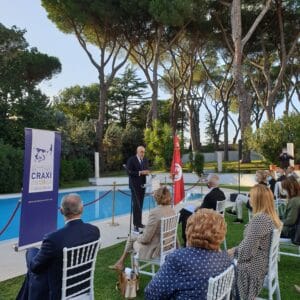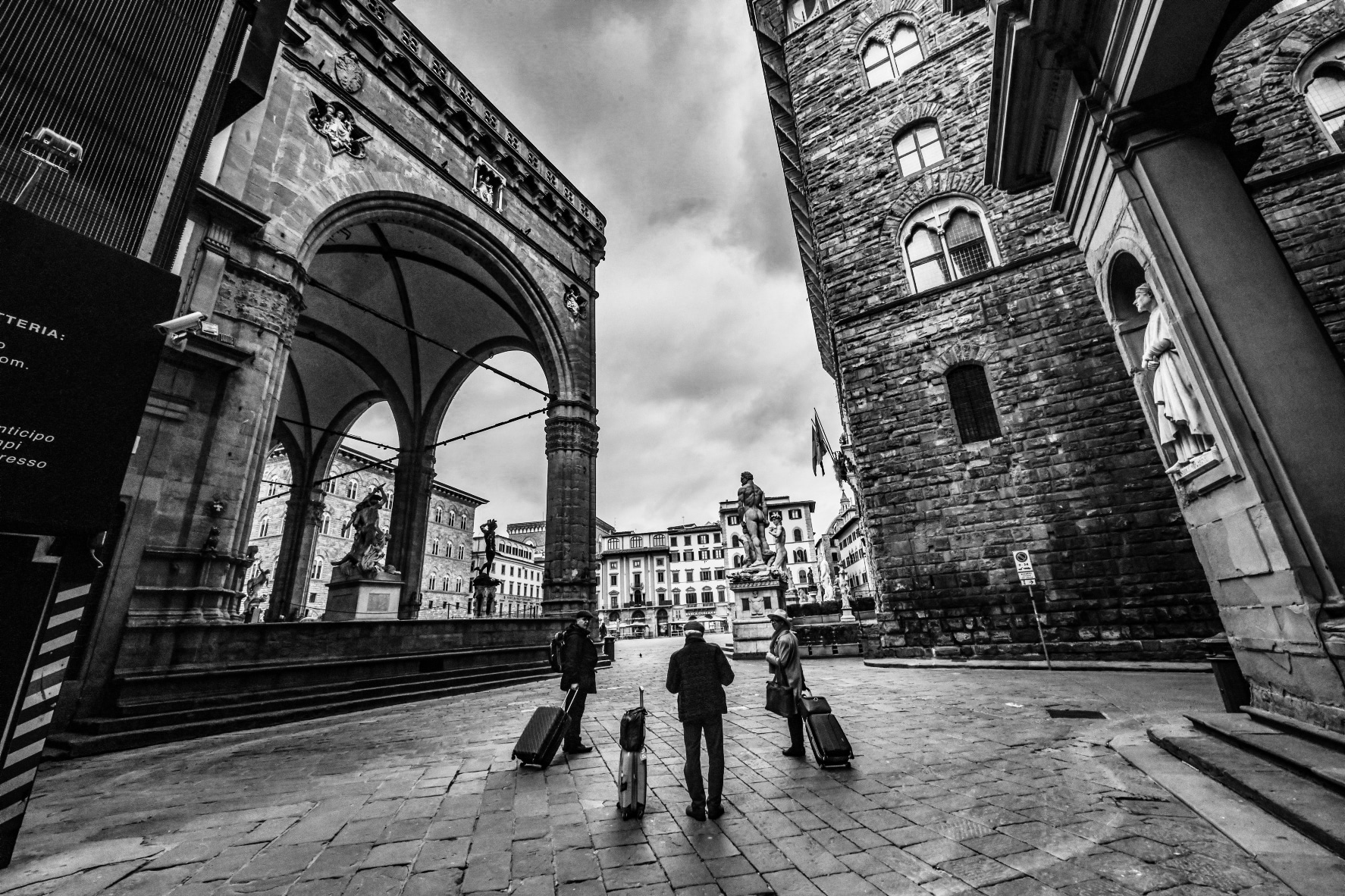Un anno fa l’Ambasciatore Mouez Sinoui ci accoglieva nella sua Residenza romana per un dialogo sulla particolarità della Tunisia, “una speranza nel Mediterraneo”, e sui rapporti fraterni con l’Italia. Dopo le turbolenze degli ultimi mesi, la Tunisia ha una nuova guida: Ne’jla Bouden. Ne parliamo con la Senatrice Stefania Craxi, Vicepresidente della Commissione Esteri.

Donna, di alto profilo, “tecnica” e ora in un ruolo apicale. Per di più in un paese arabo, sebbene avviato da decenni a un processo di secolarizzazione. È lecito dire che la Tunisia ci ha dato una lezione?
“La Tunisia che continua a stupire non è certo una novità. In questi anni travagliati nell’inquieto bacino del Mediterraneo allargato il popolo tunisino, nonostante le tante difficoltà – crisi economica, attentati terroristici, emergenza pandemica, ecc – continua a rappresentare tutto sommato un’eccezione positiva. La scelta di una personalità di alto profilo, prima ancora che di una donna, è la dimostrazione dell’esistenza di una società che al di là dei suoi travagli è viva, vitale, ed è al contempo la testimonianza, dopo gli eventi degli scorsi mesi, che la Tunisia non guarda al passato, a fantomatiche restaurazioni, ma guarda al futuro e cerca una sua strada ‘democratica’”.
Questa scelta è figlia anche di un percorso complesso di graduale costruzione di una democrazia, che comunque non rigetta l’identità musulmana come testimoniano gli artt. 1 e 2 della giovane Costituzione del 2014. È forse la Tunisia l’unico Paese dove le Primavere Arabe non hanno prodotto solo esiti negativi?
“È così. Ma dopo poco più di un decennio possiamo dire, senza timore alcuno di smentita, che le Primavere sono state un fallimento da qualunque parte le si guardi. Al di là del tema democratico – non certo marginale – e di una accresciuta emergenza sociale, la Regione è per aria, più instabile e più insicura, e si fatica a trovare un equilibrio anche a causa delle tante interferenze dei nuovi attori mediterranei (pensiamo al Qatar o alla Turchia) e alle strascicanti conseguenze del conflitto interno al mondo arabo. La Tunisia, benché abbia tenuto dritta la barra nonostante l’assenza di un vero aiuto dall’Occidente, non è però estranea a questo contesto. Ne ha risentito e ne risente. E le decisioni di Kaïs Saïed dello scorso luglio e, ora, l’indicazione di una donna alla guida del governo come Ne’jla Bouden, sono figlie anche di questo contesto, di una realtà che non vuole diventare un califfato o una teocrazia e, pur rivendicando e mantenendo le sue radici arabe, non intende subire e intraprendere la strada di una deriva islamista”.
È bene ricordare che dal 1988, con l’elezione di Benazir Bhutto in Pakistan, ad oggi, molti paesi musulmani hanno avuto premier o leader donne di primo piano. Penso a Tansu Çiller in Turchia o alla lunga leadership di Sheikh Hasina in Bangladesh. Forse scontiamo un preconcetto rispetto agli “altri”? Ne’jla Bouden è, insomma, davvero un’eccezione?
“Dobbiamo smettere di analizzare questa scelta solo sotto il suo aspetto di ‘genere’. Benché abbia un valore simbolico altissimo è riduttiva analizzarla in questo modo perché essa ha una valenza politica straordinaria. È un messaggio al mondo, in primo luogo a quei Paesi che soffiavano sulle frange tradizionaliste tunisine per imprimere svolte ‘conservatrici’, retrograde nelle forme e nei contenuti. Ora, dopo mesi di attesa, abbiamo un governo del ‘presidente’ e sfido chiunque in Italia a dare lezioni in tal senso, visto che da Monti a Draghi non è una formula a noi così sconosciuta! Ma la sfida del governo è immane! Il Primo ministro sarà chiamato, in stretto rapporto con Saïed, a dare risposte concrete all’insofferenza di un popolo che negli scorsi mesi ha chiesto a gran voce di essere governato. Non ha grandi nostalgie del passato ma pretende risposte concrete, con una soglia di povertà che non si conosceva sotto il regime di Ben Alì e una disoccupazione giovanile da record mondiale! Bisognerà dare risposte a questi temi che rappresentano una miscela di istanze sociali altamente esplosiva, determinata anche da fattori politici ed economici esogeni. Infatti, se da un lato la ‘democrazia’ ha accresciuto il debito pubblico per mantenere, com’è giusto che sia, un po’ di pace sociale, la paralisi politica e istituzionale che si è esasperata all’inverosimile dopo la morte di Essebsi era per alcuni attori funzionale per imprimere una svolta islamica… Non a caso, la borghesia, l’impresa, come la stragrande maggioranza del popolo, per ora è dalla parte del nuovo Presidente…”
Eravamo tutti in apprensione per la Tunisia. La ferita della crisi politica si è ricomposta? La sua leadership può apportare dei cambiamenti benefici ad un Paese che già rappresenta un unicum?
“Il quadro tunisino è ancora molto instabile. I tempi della sua evoluzione non sono certi come allo stato è ancora sconosciuta la sua possibile evoluzione. I fronti aperti sono tanti e sulle sorti di questa piccola ma importante nazione mediterranea si giocano molte partite. Noi dobbiamo sostenere in tutti i modi questa transizione tunisina, senza cadere nell’errore guardare all’evoluzione del suo quadro politico ed istituzionale con ottusità e schemi precostituiti, tanto dogmatici quanto dannosi per una realtà che, come ha dimostrato anche la scelta del Premier, continua a mantenere salda la barra dei diritti e delle libertà. Non è poco e non era scontato…”
Cosa dobbiamo augurarci?
“Dobbiamo sperare che la situazione in Tunisia si stabilizzi e si evitino derive estremiste alle porte di casa nostra, in un paese amico, con un popolo mite e a noi vicino, dalla ferma tradizione laica che da sempre guarda ai valori condivisi dell’Occidente. Dopo la Libia, un disastro colossale in cui l’Occidente e l’Europa ne escono a pezzi, con Italia e Francia che, seppur per ragioni diverse, portano sulla loro pelle le stigmate della sconfitta, non possiamo lasciare che la Tunisia vada alla deriva. È da sempre stato un paese strategico, un ponte tra Occidente e mondo arabo…”
L’Italia guarda interessata a questo nuovo corso?
“L’Italia dovrebbe guardare con attenzione e con grande interesse a quello che accade a Tunisi se non altro per le ragioni che ho espresso poc’anzi. Dovrebbe rinsaldare i rapporti, strutturare i canali di dialogo e di iniziativa per uno sviluppo condiviso di due Paesi economicamente compatibili che potrebbe essere foriero di risultati positivi per entrambi. Noto, però, che ci sono dei dichiaratori seriali, che ripetono, a mo’ di cantilena, frasi fatte, con posizione precostituite, sganciate dalla realtà, inutili sotto ogni profilo perché inadeguate a dare risposte al popolo tunisino ed a sostenere la transizione del Paese. Altri, invece, per incapacità o per interesse sembrano dei Mujaheddin arruolati dai “Fratelli” con posizioni che rispecchiano più gli interessi di altri attori che non dell’Italia e dell’Europa! E si dicono europeisti! Ecco, servirebbe un po’ di serietà e di sano pragmatismo se non altro perché la Tunisia è quantomeno geograficamente casa nostra. Ed i problemi di casa sono sempre i più difficili da risolvere”.
Alcune dichiarazioni sono state riprese da Assadakah: https://www.assadakah.net/post/tunisia-stefania-craxi-la-giusta-scelta-della-donna-premier
English version
A year ago Ambassador Mouez Sinoui welcomed us to his Residence in Rome for a dialogue on the particularity of Tunisia, “a hope in the Mediterranean sea”, and on fraternal relations with Italy. After the turbulence of recent months, Tunisia has a new leader: Ne’jla Bouden. We spoke about this with Senator Stefania Craxi, Vice-President of the Foreign Affairs Commission.

Female, high-profile, “technical” and now in an top role position. What’s more, in an Arab country, albeit one that has been undergoing a process of secularization for decades. Is it fair to say that Tunisia has taught us a lesson?
“Tunisia that continues to amaze is certainly nothing new. In these troubled years in the restless basin of the enlarged Mediterranean, the Tunisian people, despite the many difficulties – economic crisis, terrorist attacks, pandemic emergency, etc. – continues to represent, all things considered, a positive exception. The choice of a high-profile personality, even before that of a woman, is the demonstration of the existence of a society that beyond its troubles is alive, vital, and is at the same time the testimony, after the events of the past few months, that Tunisia does not look to the past, to phantom restorations, but looks to the future and seeks its own ‘democratic’ way”.
This choice is also the result of a complex process of the gradual construction of a democracy, which does not, however, reject the Muslim identity as evidenced by Articles 1 and 2 of the young Constitution of 2014. Is Tunisia perhaps the only country where the Arab Springs have not produced only negative outcomes?
“That’s right. But after a little more than a decade we can say, without any fear of contradiction, that the Springs have been a failure from any angle. Beyond the democratic issue – certainly not marginal – and an increased social emergency, more unstable and more insecure, and it is difficult to find a balance also because of the many interferences of the new Mediterranean players (think of Qatar or Turkey) and the trailing consequences of the conflict within the Arab world. Tunisia, although it has kept a straight face despite the lack of real help from the West, is no stranger to this context. It has suffered and is suffering. And the decisions of Kaïs Saïed last July and now, the indication of a woman at the head of the government as Ne’jla Bouden, are also daughters of this context, of a reality that does not want to become a caliphate or a theocracy and, while claiming and maintaining its Arab roots, does not intend to suffer and take the path of an Islamist drift”.
It is worth remembering that since 1988, with the election of Benazir Bhutto in Pakistan, many Muslim countries have had prominent female premiers or leaders. I am thinking of Tansu Çiller in Turkey or the long leadership of Sheikh Hasina in Bangladesh. Do we perhaps have a bias against “others”? Is Ne’jla Bouden really an exception?
“We must stop analysing this choice only under its ‘gender’ aspect. Although it has a very high symbolic value it is reductive to analyse it in this way because it has an extraordinary political value. It is a message to the world, first and foremost to those countries that were blowing on the traditionalist fringes of Tunisia to bring about ‘conservative’ changes, retrograde in form and content. Now, after months of waiting, we have a government of the ‘president’ and I challenge anyone in Italy to give lessons in this sense, given that from Monti to Draghi is not a formula so unfamiliar to us! But the challenge of government is huge! The Prime Minister will be called upon, in close liaison with Saïed, to give concrete answers to the impatience of a people who in recent months have been clamouring to be governed. They have no great nostalgia for the past, but they are demanding concrete answers, with a poverty line unheard of under the Ben Ali regime and world record youth unemployment! It will be necessary to give answers to these issues that represent a mixture of highly explosive social demands, determined also by exogenous political and economic factors. In fact, if on the one hand ‘democracy’ has increased the public debt to maintain, as it should be, some social peace, the political and institutional paralysis that has been exasperated to the hilt after the death of Essebsi was for some actors functional to impart an Islamic turn … Not surprisingly, the bourgeoisie, business, as most of the people, for now is on the side of the new President …”
We were all worried about Tunisia. Has the wound of the political crisis healed? Can your leadership bring beneficial changes to a country that is already unique?
“The Tunisian framework is still very unstable. The timing of its evolution is not certain, just as its possible evolution is still unknown. Many fronts are open, and many games are being played on the fate of this small but important Mediterranean nation. We must support this Tunisian transition in every way we can, without falling into the trap of looking at the evolution of its political and institutional framework with obtuseness and pre-constituted schemes, which are as dogmatic as they are damaging to a situation which, as the choice of Prime Minister has also shown, continues to keep a firm grip on rights and freedoms. This is not little and was not taken for granted…”
What do we have to look forward to?
“We must hope that the situation in Tunisia will stabilize and avoid extremist drifts on our doorstep, in a friendly country, with a mild-mannered people close to us, with a strong secular tradition that has always looked to the shared values of the West. After Libya, a colossal disaster in which the West and Europe came out in pieces, with Italy and France, albeit for different reasons, bearing the stigmata of defeat on their skin, we cannot let Tunisia go adrift. It has always been a strategic country, a bridge between the West and the Arab world…”
Is Italy interested in this new course?
“Italy should look with attention and great interest at what is happening in Tunis if only for the reasons I expressed earlier. It should strengthen relations, structure the channels of dialogue and initiative for shared development of two economically compatible countries that could be a harbinger of positive results for both. I note, however, that there are serial declarers, who repeat, like a chant, catchphrases, with pre-established positions, detached from reality, useless in every respect because inadequate to give answers to the Tunisian people and to support the transition of the country. Others, however, for inability or interest seem to be Mujahideen enlisted by the “Brothers” with positions that reflect the interests of other actors rather than Italy and Europe! And they call themselves Europeanists! Here, we need some seriousness and healthy pragmatism if only because Tunisia is at least geographically our home. And the problems at home are always the most difficult to solve”.
(Grazie a Roberta Vaduva)
Resta sempre aggiornato con Il Tazebao
Unisciti al gruppo Telegram per ricevere i nostri approfondimenti appena usciti. Instagram sarà il nostro supplemento fotografico. I video animano il nostro canale YouTube. Infine, inviando una mail all’indirizzo della redazione (redazione@iltazebao.com) puoi ricevere la newsletter settimanale.





